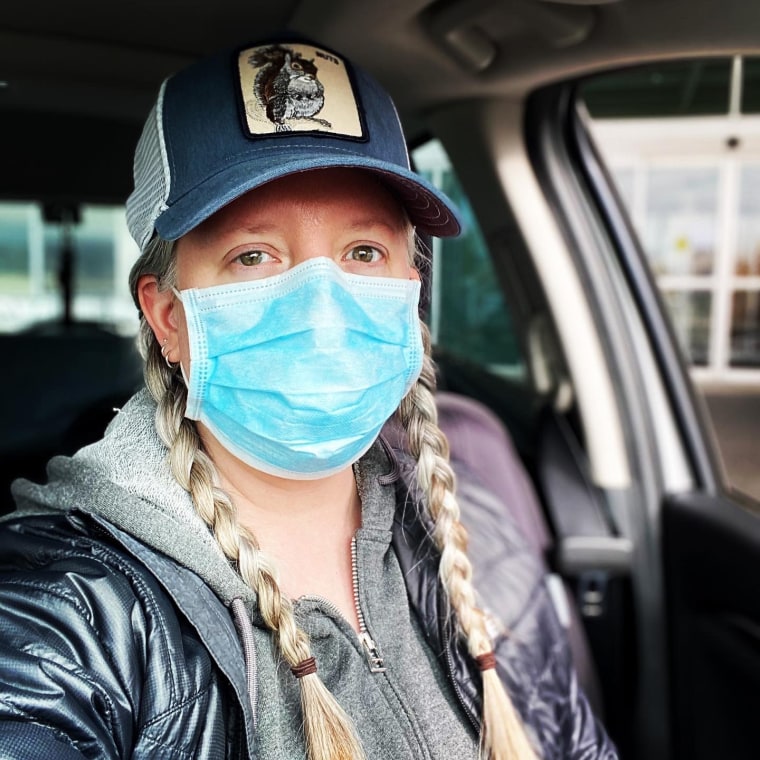COVID-19 symptoms that can linger for weeks and months after a diagnosis may be wide-ranging — and include everything from joint pain and fevers, to hair loss and double vision.
In fact, those patients, self-nicknamed the long-haulers, reported experiencing 98 different symptoms in a survey released Wednesday.
Full coverage of the coronavirus outbreak
"They're not quite sick enough to be hospitalized, but they are suffering from very severe symptoms, sometimes for a very long time at home," Natalie Lambert, an associate professor of medicine at the Indiana University School of Medicine, said.
Lambert partnered with a COVID-19 support group called Survivor Corps to survey patients on the group's Facebook page about their symptoms. She estimated more than 1,500 members of the group gave their responses.
The questionnaire asked users to identify which symptoms they were experiencing, and allowed them to add symptoms Lambert hadn't considered.
In all, patients reported 98 different symptoms they attributed to their COVID-19 diagnosis. In part, those symptoms included dizziness, anxiety, headache, rashes, joint pain, shortness of breath, heartburn, diarrhea and fevers. They also reported difficulty with memory, thinking, sleep and vision.
More than a quarter of the respondents said they experienced ongoing pain, such as body aches, nerve pain and joint pain.
All participants remained anonymous, making it impossible to confirm their diagnosis or symptoms with a physician. And it's impossible to tease out which symptoms may be directly linked to COVID-19 infection, such as fever, and which might be linked to overall stress and anxiety of being in a pandemic.
But that does not mean doctors aren't paying attention.
"When people get infected, and get sick, and maybe are in bed for a few weeks," Dr. Anthony Fauci, the nation's top expert in infectious diseases, said on MSNBC's Andrea Mitchell Reports on Wednesday, "we're starting to see that they do not recover as completely and as quickly as you would like."
"How long does it take you to get back to normal? That's an open question," he added. "We're only six months into the outbreak."
The Centers for Disease Control and Prevention lists just 11 COVID-19 symptoms on its website. However, in a significant acknowledgment, the CDC reported on long-term COVID-19 symptoms for the first time last week.
"COVID-19 can result in prolonged illness even among persons with milder outpatient illness, including young adults," the report's authors wrote.
The report found that as many as a third of the patients who were never sick enough to be hospitalized are not back to their usual health up to three weeks after their diagnosis.
Amy Watson, 47, of Portland, Oregon, is on day 137 of her COVID-19 symptoms, which include painful burning sensations on her arms, torso, head and neck.

Watson created a COVID-19 patient support group, called Long Haul COVID Fighters. The name, she said, was inspired by the hat she threw on the day she went in for her COVID-19 test back in April.
"I hadn't washed my hair in like three days, and it was just gross, so I threw the hat on," she said. "The group is named after my squirrel trucker hat."
The nickname stuck, and is now used by many doctors and organizations who identify with the long-haulers.
Watson is not part of Survivor Corps, but is not surprised by the survey's findings.
"I just talked to someone the other day who has double vision," Watson said. She asked the person whether it was a problem before COVID-19. The answer was no.
The patient "said it didn't develop until week 16."
Download the NBC News app for full coverage of the coronavirus outbreak
Most long-haulers find support online as the medical community catches up. There are no specific treatments for this group of people; only symptom management.
"Until there is more research that helps us to understand why these long-term symptoms are happening and how to treat them, thousands of long haulers will continue to suffer at home," Lambert wrote in a news release, "both from painful COVID-19 symptoms and uncertainty about when they will feel well again."

